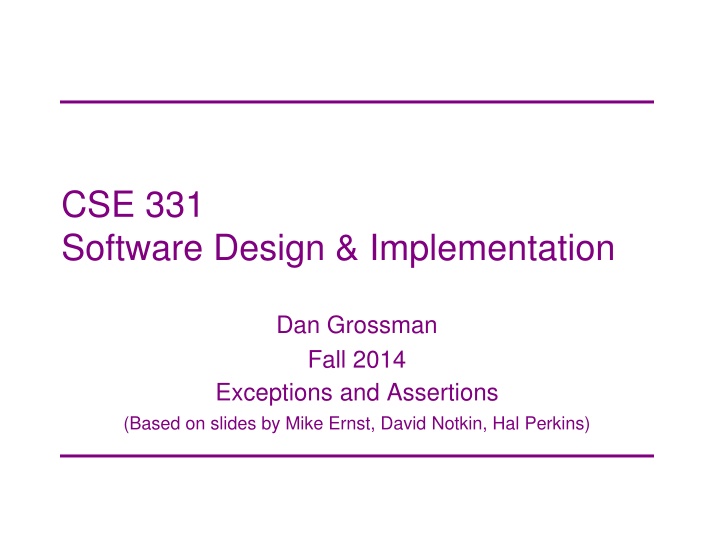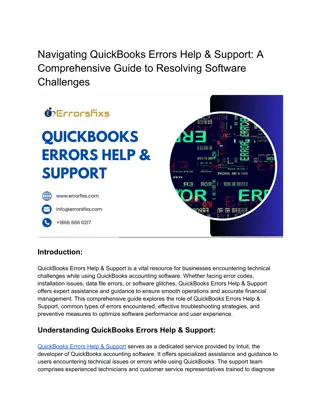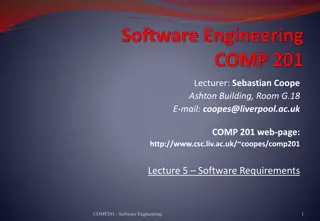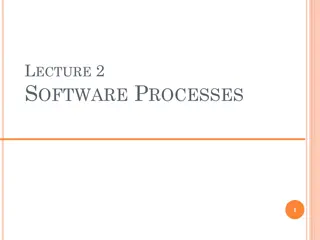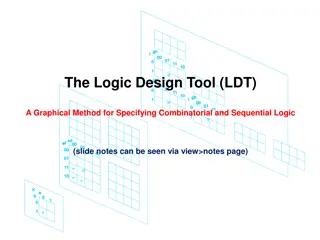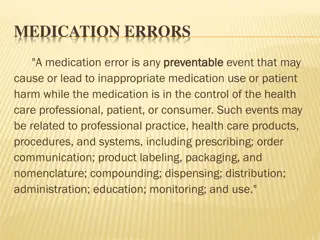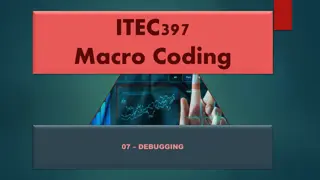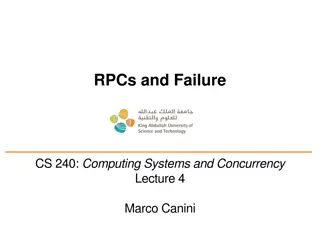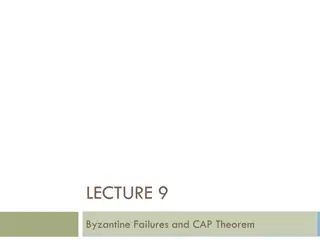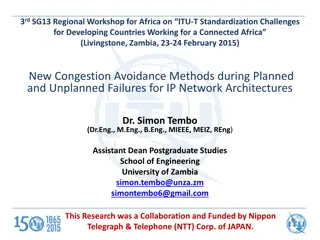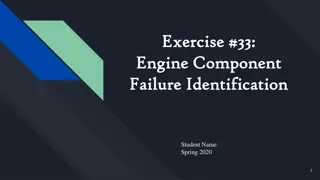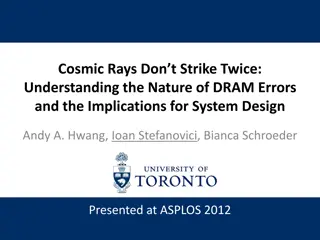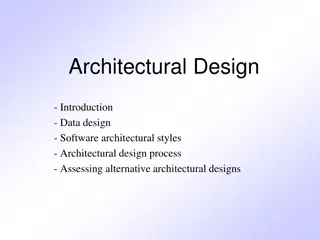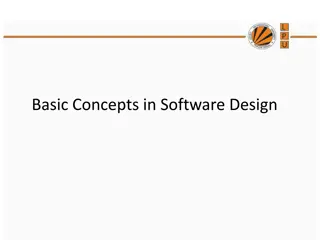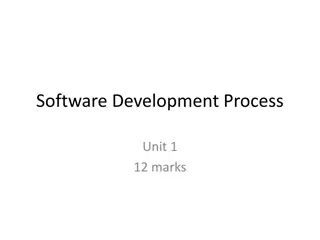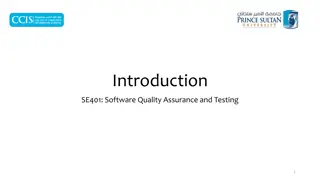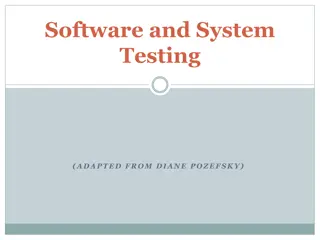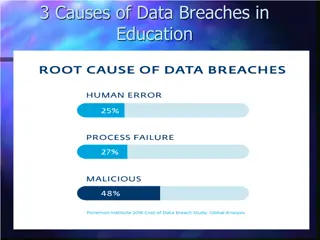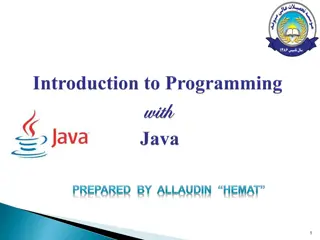Handling Errors and Failures in Software Design and Implementation
Exploring the concepts of dealing with errors and failures in software development, focusing on assertions and exceptions. Discusses the importance of preventing complete failures, giving information about problems, and preventing harm when things go wrong. Emphasizes the significance of structuring code to be reliable and understandable, while also addressing common causes of failures. Provides insights on avoiding errors through preconditions and specifying behavior.
Download Presentation

Please find below an Image/Link to download the presentation.
The content on the website is provided AS IS for your information and personal use only. It may not be sold, licensed, or shared on other websites without obtaining consent from the author.If you encounter any issues during the download, it is possible that the publisher has removed the file from their server.
You are allowed to download the files provided on this website for personal or commercial use, subject to the condition that they are used lawfully. All files are the property of their respective owners.
The content on the website is provided AS IS for your information and personal use only. It may not be sold, licensed, or shared on other websites without obtaining consent from the author.
E N D
Presentation Transcript
CSE 331 Software Design & Implementation Dan Grossman Fall 2014 Exceptions and Assertions (Based on slides by Mike Ernst, David Notkin, Hal Perkins)
Outline General concepts about dealing with errors and failures Assertions: what, why, how For things you believe will/should never happen Exceptions: what, how in Java How to throw, catch, and declare exceptions Subtyping of exceptions Checked vs. unchecked exceptions Exceptions: why in general For things you believe are bad and should rarely happen And many other style issues Alternative with trade-offs: Returning special values Summary and review CSE331 Fall 2014 2
Failure causes Partial failure is inevitable Goal: prevent complete failure Structure your code to be reliable and understandable Some failure causes: 1. Misuse of your code Precondition violation 2. Errors in your code Bugs, representation exposure, 3. Unpredictable external problems Out of memory, missing file, CSE331 Fall 2014 3
What to do when something goes wrong Fail early, fail friendly Goal 1: Give information about the problem To the programmer a good error message is key! To the client code: via exception or return-value or Goal 2: Prevent harm Abort: inform a human Perform cleanup actions, log the error, etc. Re-try: Problem might be transient Skip a subcomputation: Permit rest of program to continue Fix the problem? Usually infeasible to repair from an unexpected state CSE331 Fall 2014 4
Avoiding errors A precondition prohibits misuse of your code Adding a precondition weakens the spec This ducks the problem of errors-will-happen Mistakes in your own code Misuse of your code by others Removing a precondition requires specifying more behavior Often a good thing, but there are tradeoffs Strengthens the spec Example: specify that an exception is thrown CSE331 Fall 2014 5
Outline General concepts about dealing with errors and failures Assertions: what, why, how For things you believe will/should never happen Exceptions: what, how How to throw, catch, and declare exceptions in Java Subtyping of exceptions Checked vs. unchecked exceptions Exceptions: why in general For things you believe are bad and should rarely happen And many other style issues Alternative with trade-offs: Returning special values Summary and review CSE331 Fall 2014 6
Defensive programming Check: Precondition Postcondition Representation invariant Other properties that you know to be true Check statically via reasoning and tools Check dynamically via assertions assert index >= 0; assert items != null : "null item list argument" assert size % 2 == 0 : "Bad size for " + Write assertions as you write code Include descriptive messages toString(); CSE331 Fall 2014 7
Enabling assertions In Java, assertions can be enabled or disabled at runtime without recompiling Command line: java ea runs code with assertions enabled java runs code with assertions disabled (default) Eclipse: Select Run>Run Configurations then add -ea to VM arguments under (x)=arguments tab (These tool details were covered in section already) CSE331 Fall 2014 8
When not to use assertions Don t clutter the code with useless, distracting repetition x = y + 1; assert x == y + 1; Don t perform side effects assert list.remove(x);// won t happen if disabled // Better: boolean found = list.remove(x); assert found; Turn them off in rare circumstances (production code(?) ) Most assertions better left enabled CSE331 Fall 2014 9
assert and checkRep() CSE 331 s checkRep() is another dynamic check Strategy: use assert in checkRep() to test and fail with meaningful traceback/message if trouble found Be sure to enable asserts when you do this! Asserts should be enabled always for CSE 331 projects We will enable them for grading CSE331 Fall 2014 10
Expensive checkRep()tests Detailed checks can be too slow in production But complex tests can be very helpful, particularly during testing/debugging (let the computer find problems for you!) No perfect answers; suggested strategy for checkRep: Create a static, global debug or debugLevel variable Run expensive tests when this is enabled Turn it off in graded / production code if tests are too expensive Often helpful: put expensive / complex tests in separate methods and call as needed CSE331 Fall 2014 11
Square root // requires: x 0 // returns: approximation to square root of x public double sqrt(double x) { ... } CSE331 Fall 2014 12
Square root with assertion // requires: x 0 // returns: approximation to square root of x public double sqrt(double x) { assert (x >= 0.0); double result; compute result assert (Math.abs(result*result x) < .0001); return result; } These two assertions serve very different purposes CSE331 Fall 2014 13
Outline General concepts about dealing with errors and failures Assertions: what, why, how For things you believe will/should never happen Exceptions: what, how How to throw, catch, and declare exceptions in Java Subtyping of exceptions Checked vs. unchecked exceptions Exceptions: why in general For things you believe are bad and should rarely happen And many other style issues Alternative with trade-offs: Returning special values Summary and review CSE331 Fall 2014 14
Square root, specified for all inputs // throws: IllegalArgumentException if x < 0 // returns: approximation to square root of x public double sqrt(double x) throws IllegalArgumentException { if (x < 0) throw new IllegalArgumentException(); } throwsis part of a method signature: it might happen Comma-separated list throw is a statement that actually causes exception-throw Immediate control transfer [like return but different] CSE331 Fall 2014 15
Using try-catch to handle exceptions public double sqrt(double x) throws IllegalArgumentException Client code: try { y = sqrt( ); } catch (IllegalArgumentException e) { e.printStackTrace(); //and/or take other actions } Handled by nearest dynamically enclosing try/catch Top-level default handler: stack trace, program terminates CSE331 Fall 2014 16
Throwing and catching Executing program has a stack of currently executing methods Dynamic: reflects runtime order of method calls No relation to static nesting of classes, packages, etc. When an exception is thrown, control transfers to nearest method with a matching catch block If none found, top-level handler prints stack trace and terminates Exceptions allow non-local error handling A method many levels up the stack can handle a deep error CSE331 Fall 2014 17
Catching with inheritance try { code } catch (FileNotFoundException fnfe) { code to handle a file not found exception } catch (IOException ioe) { code to handle any other I/O exception } catch (Exception e) { code to handle any other exception } A SocketException would match the second block An ArithmeticException would match the third block Subsequent catch blocks need not be supertypes like this CSE331 Fall 2014 18
Exception Hierarchy CSE331 Fall 2014 19
Javas checked/unchecked distinction Checked exceptions (style: for special cases) Callee: Must declare in signature (else type error) Client: Must either catch or declare (else type error) Even if you can prove it will never happen at run time, the type system does not believe you There is guaranteed to be a dynamically enclosing catch Unchecked exceptions (style: for never-expected) Library: No need to declare Client: No need to catch Subclasses of RuntimeException and Error Throwable Exception Error Checked exceptions Runtime Exception CSE331 Fall 2014 20
Checked vs. unchecked No perfect answer to should possible exceptions thrown be part of a method signature So Java provided both Advantages to checked exceptions: Static checking callee ensures no other checked exceptions get thrown Static checking caller ensures caller does not forget to check Disadvantages: Impedes implementations and overrides Often in your way when prototyping Have to catch or declare even in clients where the exception is not possible CSE331 Fall 2014 21
The finally block finally block is always executed Whether an exception is thrown or not try { code } catch (Type name) { code to handle the exception } finally { code to run after the try or catch finishes } CSE331 Fall 2014 22
What finally is for finallyis used for common, must-always-run or clean-up code Avoids duplicated code in catch branch[es] and after Avoids having to catch all exceptions try { // ... write to out; might throw exception } catch (IOException e) { System.out.println("Caught IOException: + e.getMessage()); } finally { out.close(); } CSE331 Fall 2014 23
Outline General concepts about dealing with errors and failures Assertions: what, why, how For things you believe will/should never happen Exceptions: what, how in Java How to throw, catch, and declare exceptions Subtyping of exceptions Checked vs. unchecked exceptions Exceptions: why in general For things you believe are bad and should rarely happen And many other style issues Alternative with trade-offs: Returning special values Summary and review CSE331 Fall 2014 24
Propagating an exception // returns: x such that ax^2 + bx + c = 0 // throws: IllegalArgumentException if no real soln exists double solveQuad(double a, double b, double c) throws IllegalArgumentException { // No need to catch exception thrown by sqrt return (-b + sqrt(b*b - 4*a*c)) / (2*a); } Aside: How can clients know if a set of arguments to solveQuad is illegal? CSE331 Fall 2014 25
Why catch exceptions locally? Failure to catch exceptions usually violates modularity Call chain: A IntegerSet.insert IntegerList.insert IntegerList.insert throws some exception Implementer of IntegerSet.insert knows how list is being used Implementer of A may not even know that IntegerList exists Method on the stack may think that it is handling an exception raised by a different call Better alternative: catch it and throw it again chaining or translation Do this even if the exception is better handled up a level Makes it clear to reader of code that it was not an omission CSE331 Fall 2014 26
Exception translation // returns: x such that ax^2 + bx + c = 0 // throws: NotRealException if no real solution exists double solveQuad(double a, double b, double c) throws NotRealException { try { return (-b + sqrt(b*b - 4*a*c)) / (2*a); } catch (IllegalArgumentException e) { throw new NotRealException(); // chaining } } class NotRealException extends Exception { NotRealException() { super(); } NotRealException(String message) { super(message); } NotRealException(Throwable cause) { super(cause); } NotRealException(String msg, Throwable c) { super(msg, c); } } CSE331 Fall 2014 27
Exceptions as non-local control flow void compile() { try { parse(); typecheck(); optimize(); generate(): } catch (RuntimeException e) { Logger.log("Failed: " + e.getMessage()); } } Not common usually bad style, particularly at small scale Java/C++, etc. exceptions are expensive if thrown/caught Reserve exceptions for exceptional conditions CSE331 Fall 2014 28
Two distinct uses of exceptions Failures Unexpected Should be rare with well-written client and library Can be the client s fault or the library s Usually unrecoverable Special results Expected but not the common case Unpredictable or unpreventable by client CSE331 Fall 2014 29
Handling exceptions Failures Usually can t recover If condition not checked, exception propagates up the stack The top-level handler prints the stack trace Unchecked exceptions the better choice (else many methods have to declare they throw it) Special results Take special action and continue computing Should always check for this condition Should handle locally by code that knows how to continue Checked exceptions the better choice (encourages local handling) CSE331 Fall 2014 30
Dont ignore exceptions Effective Java Tip #65: Don't ignore exceptions Empty catch block is (common) poor style often done to get code to compile despite checked exceptions Worse reason: to silently hide an error try { readFile(filename); } catch (IOException e) {} // silent failure At a minimum, print out the exception so you know it happened And exit if that s appropriate for the application } catch (IOException e) { e.printStackTrace(); System.exit(1); } CSE331 Fall 2014 31
Outline General concepts about dealing with errors and failures Assertions: what, why, how For things you believe will/should never happen Exceptions: what, how in Java How to throw, catch, and declare exceptions Subtyping of exceptions Checked vs. unchecked exceptions Exceptions: why in general For things you believe are bad and should rarely happen And many other style issues Alternative with trade-offs: Returning special values Summary and review CSE331 Fall 2014 32
Informing the client of a problem Special value: null for Map.get -1 for indexOf NaN for sqrt of negative number Advantages: For a normal-ish, common case, it is the result Less verbose clients than try/catch machinery Disadvantages: Error-prone: Callers forget to check, forget spec, etc. Need extra result: Doesn t work if every result could be real Example: if a map could store null keys Has to be propagated manually one call at a time General Java style advice: Exceptions for exceptional conditions Up for debate if indexOf not-present-value is exceptional CSE331 Fall 2014 33
Special values in C/C++/others For errors and exceptional conditions in Java, use exceptions! But C doesn t have exceptions and some C++ projects avoid them Over decades, a common idiom has emerged Error-prone but you can get used to it Affects how you read code Put results in out-parameters Result is a boolean (int in C) to indicate success or failure type result; if(!computeSomething(&result)) { return 1; } // no "exception", use result Bad, but less bad than error-code-in-global-variable CSE331 Fall 2014 34
Outline General concepts about dealing with errors and failures Assertions: what, why, how For things you believe will/should never happen Exceptions: what, how in Java How to throw, catch, and declare exceptions Subtyping of exceptions Checked vs. unchecked exceptions Exceptions: why in general For things you believe are bad and should rarely happen And many other style issues Alternative with trade-offs: Returning special values Summary and review CSE331 Fall 2014 35
Exceptions: review Use an exception when Used in a broad or unpredictable context Checking the condition is feasible Use a precondition when Checking would be prohibitive E.g., requiring that a list be sorted Used in a narrow context in which calls can be checked Use a special value when It is a reasonable common-ish situation Clients are likely (?) to remember to check for it Use an assertion for internal consistency checks that should not fail CSE331 Fall 2014 36
Exceptions: review, continued Use checked exceptions most of the time Static checking is helpful But maybe avoid checked exceptions if possible for many callers to guarantee exception cannot occur Handle exceptions sooner rather than later Not all exceptions are errors Example: File not found Good reference: Effective Java, Chapter 9 A whole chapter? Exception-handling design matters! CSE331 Fall 2014 37
